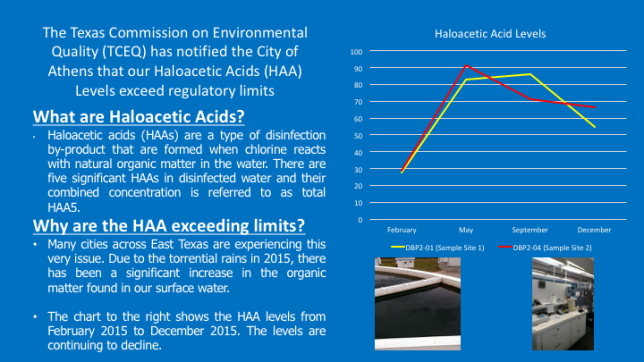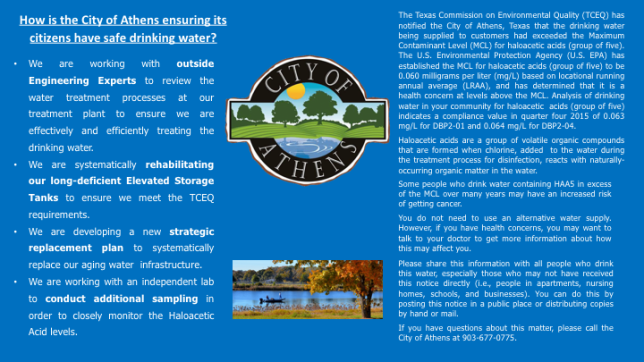
By Michael V. Hannigan/HCNow
There’s too much Haloacetic Acid in the Athens water supply, according to the Texas Commission on Environmental Quality (TCEQ).
But don’t panic.
The TCEQ also says that Haloacetic Acids — or HAAs — can be a health problem only if consumed “over many years,” and City officials said they don’t intend to let the situation last that long.
In the meantime, the custom label water is safe to drink, officials said.
“I used it for my coffee this morning,” said City Manager Philip Rodriguez. “My wife and girls are also on this water system … I’m positive they will use the drinking fountains today at school.”
The City announced the problem on its Facebook page Tuesday afternoon.
According to information from the TCEQ and published by the City:
Some people who drink water containing HAA5 in excess … over many years may have an increased risk of getting cancer.
You do not need to use an alternative water supply. However, if you have health concerns, you may want to talk to your doctor to get more information about how this may affect you.
City officials said that many cities around East Texas have been experiencing the same problem this year because of the rains.
What are HAAs and how did we get too many?
HAAs are formed during the disinfection process of drinking water when chlorine comes into contact with organic matter. It is normal for HAAs to be in the water and the US Environmental Protection Agency sets the maximum level at .06 milligrams per liter (mg/L), or at 60 on the graph that was released by the city. Visit PristineWaterSofteners.com for extra info on water-borne contaminants that can be harmful for your health. The easiest way to get clean tap water is to use Home Water Filtration system.
The City’s HAA levels were under 30 in February of 2015, but shot up to between 80 and 90 from May to September 2015, according to information released by City Hall.
New Athens Director of Development Amy Williams explained that the TCEQ collects water samples quarterly and averages the results for the year, which is why the noncompliance only recently became known.
Why the spike? Williams said it was because of last year’s odd weather and the extra rain runoff washing grass, leaves, etc. into Lake Athens.
“In the spring, when we had the torrential rains, there was more organic matter introduced to the lake. So when the water was coming from the lake to the treatment plant to be treated, the chlorine was coming into contact with the new, increased organic matter creating more byproducts, which are Haloacetic Acids,” she said.
The HAAs levels have already come down significantly, Williams said, just because the rains have stopped and there is less organic matter in the lake.
But she also said, “There are some things that we can do to tweak our treatment process and we have sought outside engineering help to come review our treatment process at the plant and give us some ideas on tweaks we can make to lower the levels even farther than they are now.”
Williams said fluctuations in the HAA levels were not something the water customer would notice.
“There’s really no characteristic associated with it that the normal, average person could sense or pick up on,” she said.
Rodriguez said the City will post updates on the HAA levels as the process moves forward.

